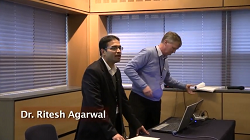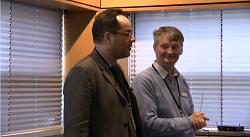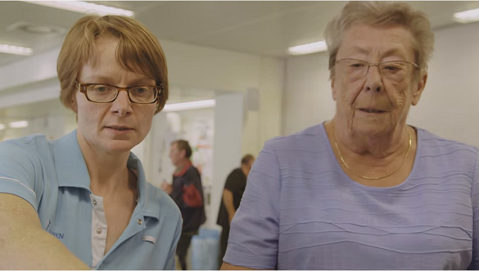In this lecture, Dr. Hooper introduces us to the fascinating world of human gut microbiota; the microorganisms that live within our bodies. Although we may think that most bacteria are harmful, Hooper provides ample evidence that symbiotic gut microbes are important to good human health. Her lab is interested in understanding how the gut microbiota changes during illness or disease and how it influences our ability to fight infections. Using germ-free mice, they were able to demonstrate that a healthy gut microbiota can shape development of the host immune system and provide protection against dangerous infections like salmonella.
In the second part of her talk, Hooper explains how the balance of organisms in the gut microbiota is maintained. By comparing DNA microarray data from normal mice and germ-free mice, Hooper’s lab was able to look for genes induced by the gut microbiota. They identified RegIIIγ, an important protein involved in the protection against pathogenic bacteria. They showed that RegIIIγ forms pore complexes in the membranes of gram-positive bacteria and kills them. In mice and humans, the intestinal epithelium is coated with a layer of mucus. Typically, there is a gap between gut bacteria, which are found in the outer part of the mucus layer, and the epithelial cells. Hooper’s lab showed that RegIIIγ helps to maintain this gap by preventing gram-positive bacteria from colonizing the intestinal epithelial surface. This, in turn, prevents infection of the host.
![]()
Speaker Bio
Although she always was interested in science, Lora Hooper’s love for biology started after taking an introductory class at Rhodes College in Memphis, TN where she was an undergraduate. Hooper continued her graduate education in the Molecular Cell Biology and Biochemistry Program at Washington University in St. Louis where she joined Jacques Baenziger’s lab. For postdoctoral training, she stayed at Washington University, in the lab of Jeffrey Gordon, where she began her studies of the interaction between gut bacteria and host cells and discovered that bacteria have the capacity to modify carbohydrates important for cell signaling.
Currently, Hooper is a Professor of Immunology at The University of Texas Southwestern Medical Center and a Howard Hughes Medical Institute Investigator. She has established one of the handful of mouse facilities that have the capacity to breed germ-free mice. Using these mice, her lab explores the symbiotic relationship between a host and its microbiota with the aim of providing insight into human health.
Hooper was a recipient of the Edith and Peter O’Donnell Awards in 2013 and in 2015 she was elected to the National Academy of Sciences.
Learn more about Lora Hooper at http://hooperlab.org/ and http://www.hhmi.org/scientists/lora-v-hooper
http://www.ibiology.org/ibioseminars/maintaining-host-microbe-symbiosis-part-2.html
Medical and Patient education videos
-
Title
Description
-

News article made for the regional BBC TV program North West Tonight during the 7th Advances Against Aspergillosis Meeting in Manchester, UK. March 3rd 2016.
-

Dr Ritesh Argawal discusses fungal sinusitis and allergic bronchopulmonary aspergillosis (ABPA) with patients.
-

Dr Richard Moss discusses allergic Aspergillosis, Asthma, children affected by Aspergillus + Q & A with patients.
-

Darius Armstrong-James discusses a new aspergillosis clinic in the South East + Q & A with patients.
-

BBC ran an awareness story during the Advances Against Aspergillosis conference in Manchester, UK about the dangers to our health posed by Aspergillus and some of the most common ways the fungus can grow and multiply in our homes. Ann Saunders and Prof David Denning, Director of the National Aspergillosis Centre helped discuss the issues.
Estimated audience at 7.40am is 1.5 million.
-

The international Advances Against Aspergillosis conference came to Manchester this year (2016) and brought together the aspergillosis medical, scientific and patient communities for the first time in two years. Much progress was discussed and reported, awareness reaching 5 million people via UK TV BBC1 during the meeting.
-

ERS Vision: Take the Active Option: the benefits of exercise in respiratory medicine



